Analysis of HRM Challenges in Tourism and Hospitality Operations
VerifiedAdded on 2023/01/23
|8
|1848
|23
Report
AI Summary
This report provides a comprehensive analysis of the challenges in Human Resource Management (HRM) within the tourism and hospitality industry. It highlights key issues such as attracting and retaining employees, training and development, labor costs, and the impact of both internal and external factors. The report emphasizes the evolving nature of HRM and the importance of aligning organizational strategies with effective workforce management. It discusses the trend of decentralizing responsibilities to line managers and the significance of Corporate Social Responsibility (CSR) in improving employer-employee relationships. The report also addresses employee satisfaction, its impact on customer service, and the overall business performance. Personal recommendations include adopting HR differentiation strategies, increasing CSR practices, and prioritizing employee job satisfaction to enhance customer service quality and business profitability. The report emphasizes the importance of HR professionals in driving organizational success within the hospitality sector.
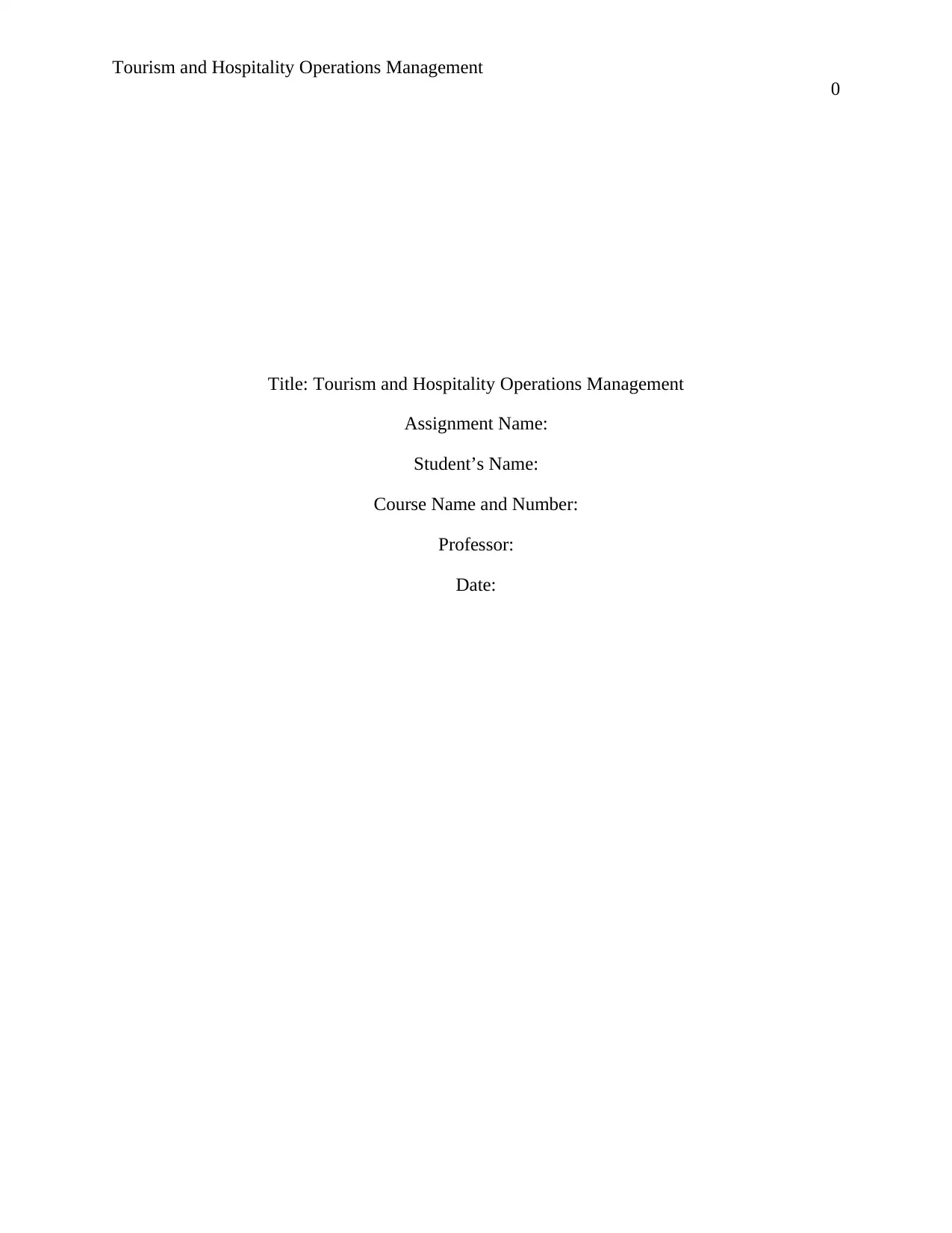
Tourism and Hospitality Operations Management
0
Title: Tourism and Hospitality Operations Management
Assignment Name:
Student’s Name:
Course Name and Number:
Professor:
Date:
0
Title: Tourism and Hospitality Operations Management
Assignment Name:
Student’s Name:
Course Name and Number:
Professor:
Date:
Paraphrase This Document
Need a fresh take? Get an instant paraphrase of this document with our AI Paraphraser
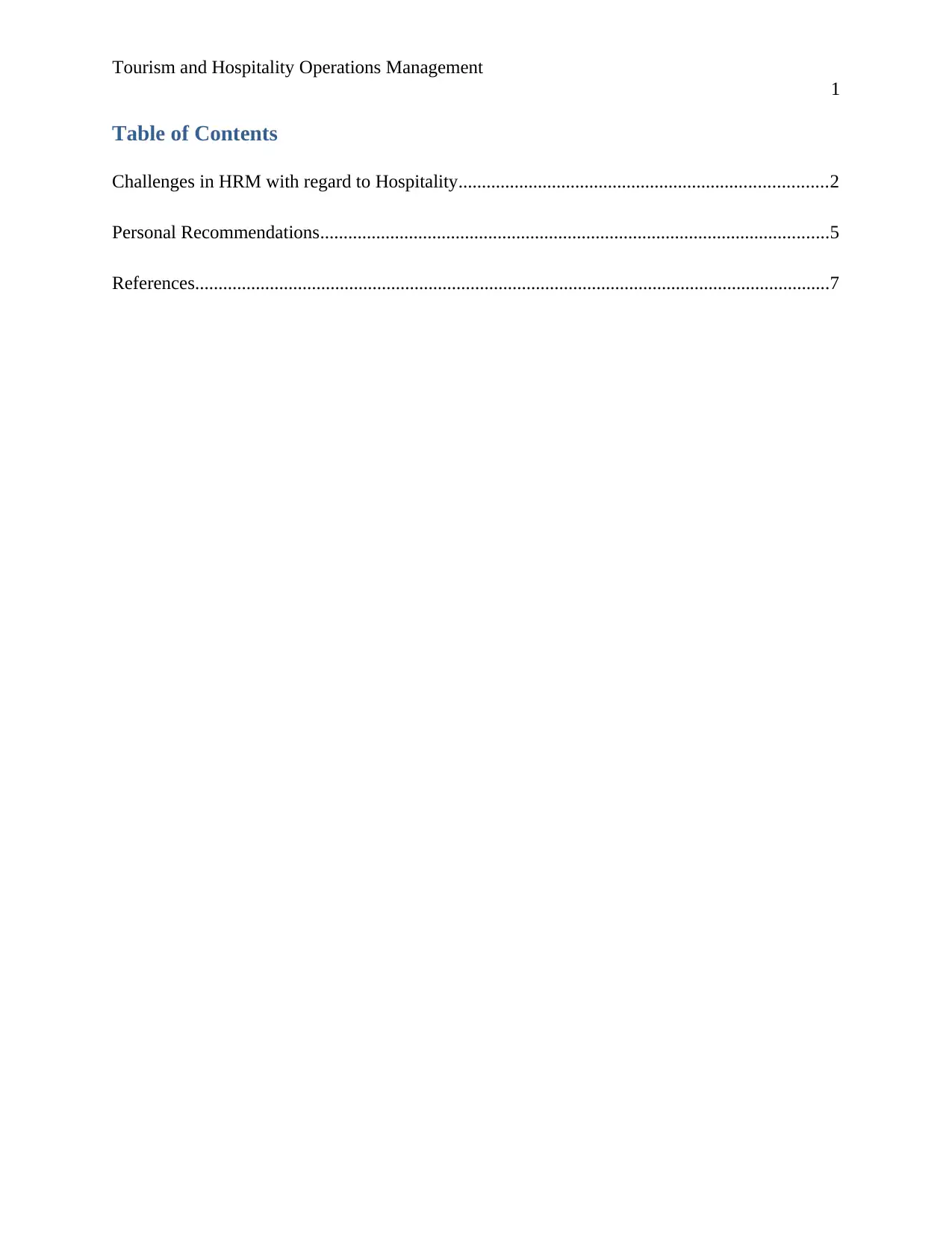
Tourism and Hospitality Operations Management
1
Table of Contents
Challenges in HRM with regard to Hospitality...............................................................................2
Personal Recommendations.............................................................................................................5
References........................................................................................................................................7
1
Table of Contents
Challenges in HRM with regard to Hospitality...............................................................................2
Personal Recommendations.............................................................................................................5
References........................................................................................................................................7
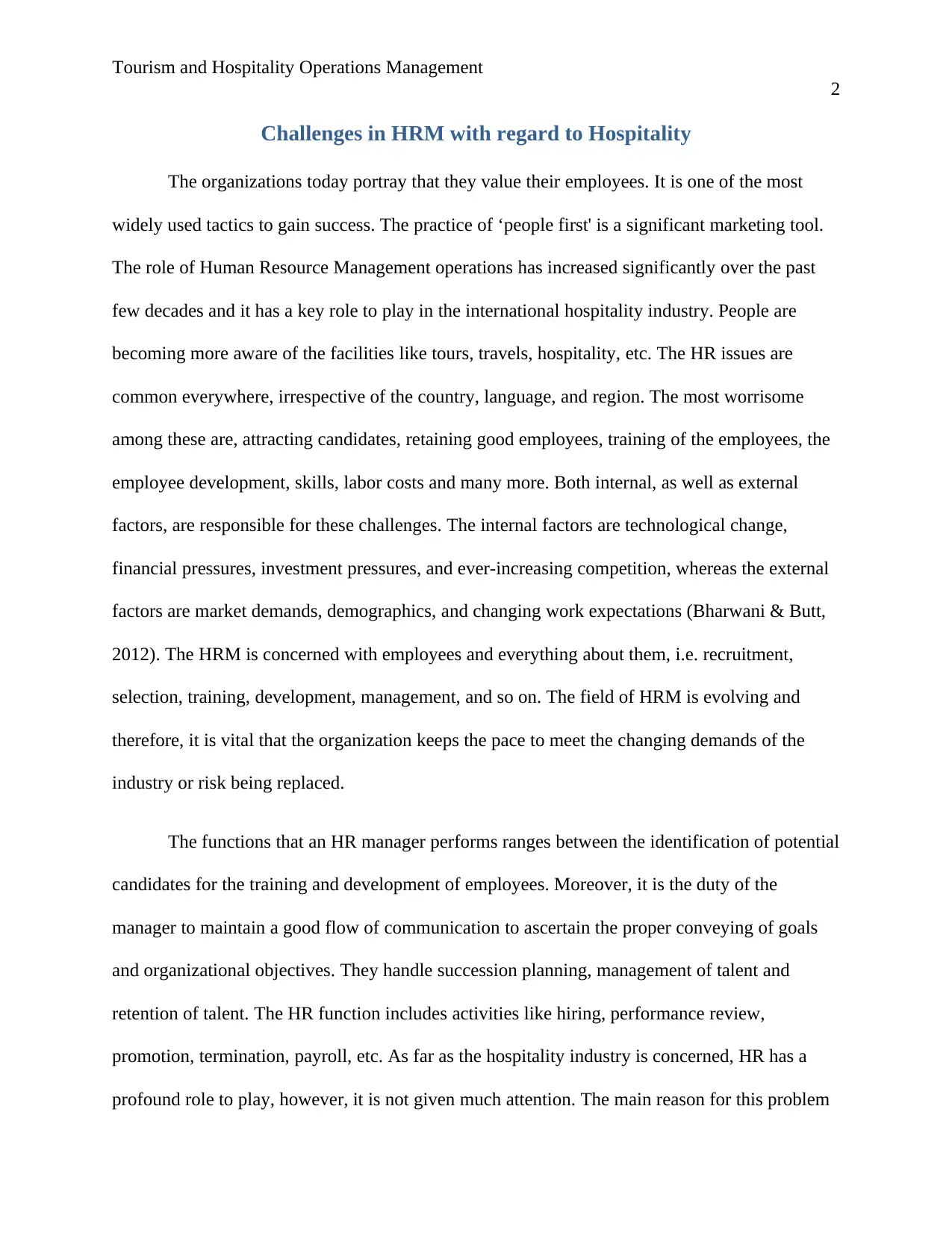
Tourism and Hospitality Operations Management
2
Challenges in HRM with regard to Hospitality
The organizations today portray that they value their employees. It is one of the most
widely used tactics to gain success. The practice of ‘people first' is a significant marketing tool.
The role of Human Resource Management operations has increased significantly over the past
few decades and it has a key role to play in the international hospitality industry. People are
becoming more aware of the facilities like tours, travels, hospitality, etc. The HR issues are
common everywhere, irrespective of the country, language, and region. The most worrisome
among these are, attracting candidates, retaining good employees, training of the employees, the
employee development, skills, labor costs and many more. Both internal, as well as external
factors, are responsible for these challenges. The internal factors are technological change,
financial pressures, investment pressures, and ever-increasing competition, whereas the external
factors are market demands, demographics, and changing work expectations (Bharwani & Butt,
2012). The HRM is concerned with employees and everything about them, i.e. recruitment,
selection, training, development, management, and so on. The field of HRM is evolving and
therefore, it is vital that the organization keeps the pace to meet the changing demands of the
industry or risk being replaced.
The functions that an HR manager performs ranges between the identification of potential
candidates for the training and development of employees. Moreover, it is the duty of the
manager to maintain a good flow of communication to ascertain the proper conveying of goals
and organizational objectives. They handle succession planning, management of talent and
retention of talent. The HR function includes activities like hiring, performance review,
promotion, termination, payroll, etc. As far as the hospitality industry is concerned, HR has a
profound role to play, however, it is not given much attention. The main reason for this problem
2
Challenges in HRM with regard to Hospitality
The organizations today portray that they value their employees. It is one of the most
widely used tactics to gain success. The practice of ‘people first' is a significant marketing tool.
The role of Human Resource Management operations has increased significantly over the past
few decades and it has a key role to play in the international hospitality industry. People are
becoming more aware of the facilities like tours, travels, hospitality, etc. The HR issues are
common everywhere, irrespective of the country, language, and region. The most worrisome
among these are, attracting candidates, retaining good employees, training of the employees, the
employee development, skills, labor costs and many more. Both internal, as well as external
factors, are responsible for these challenges. The internal factors are technological change,
financial pressures, investment pressures, and ever-increasing competition, whereas the external
factors are market demands, demographics, and changing work expectations (Bharwani & Butt,
2012). The HRM is concerned with employees and everything about them, i.e. recruitment,
selection, training, development, management, and so on. The field of HRM is evolving and
therefore, it is vital that the organization keeps the pace to meet the changing demands of the
industry or risk being replaced.
The functions that an HR manager performs ranges between the identification of potential
candidates for the training and development of employees. Moreover, it is the duty of the
manager to maintain a good flow of communication to ascertain the proper conveying of goals
and organizational objectives. They handle succession planning, management of talent and
retention of talent. The HR function includes activities like hiring, performance review,
promotion, termination, payroll, etc. As far as the hospitality industry is concerned, HR has a
profound role to play, however, it is not given much attention. The main reason for this problem
⊘ This is a preview!⊘
Do you want full access?
Subscribe today to unlock all pages.

Trusted by 1+ million students worldwide
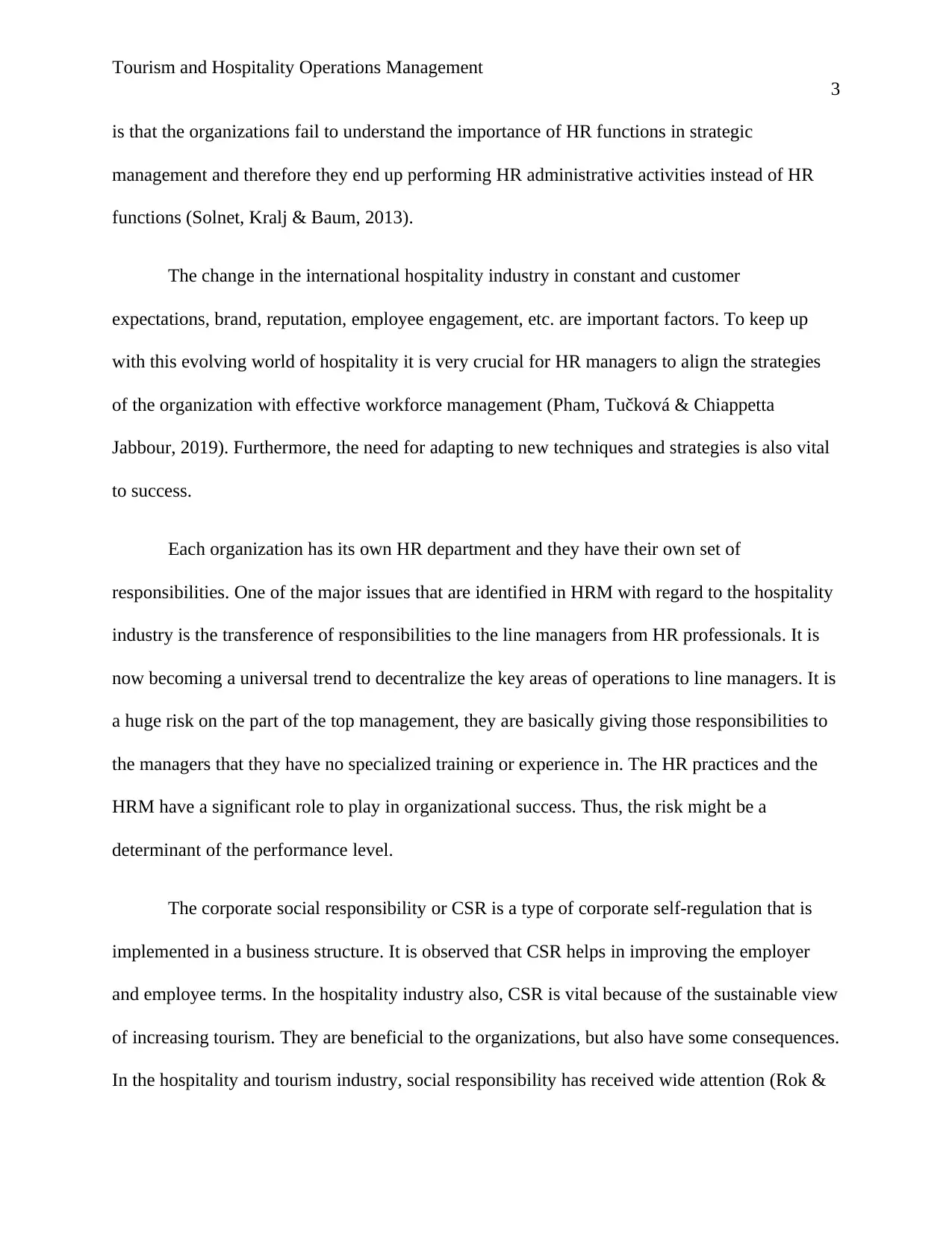
Tourism and Hospitality Operations Management
3
is that the organizations fail to understand the importance of HR functions in strategic
management and therefore they end up performing HR administrative activities instead of HR
functions (Solnet, Kralj & Baum, 2013).
The change in the international hospitality industry in constant and customer
expectations, brand, reputation, employee engagement, etc. are important factors. To keep up
with this evolving world of hospitality it is very crucial for HR managers to align the strategies
of the organization with effective workforce management (Pham, Tučková & Chiappetta
Jabbour, 2019). Furthermore, the need for adapting to new techniques and strategies is also vital
to success.
Each organization has its own HR department and they have their own set of
responsibilities. One of the major issues that are identified in HRM with regard to the hospitality
industry is the transference of responsibilities to the line managers from HR professionals. It is
now becoming a universal trend to decentralize the key areas of operations to line managers. It is
a huge risk on the part of the top management, they are basically giving those responsibilities to
the managers that they have no specialized training or experience in. The HR practices and the
HRM have a significant role to play in organizational success. Thus, the risk might be a
determinant of the performance level.
The corporate social responsibility or CSR is a type of corporate self-regulation that is
implemented in a business structure. It is observed that CSR helps in improving the employer
and employee terms. In the hospitality industry also, CSR is vital because of the sustainable view
of increasing tourism. They are beneficial to the organizations, but also have some consequences.
In the hospitality and tourism industry, social responsibility has received wide attention (Rok &
3
is that the organizations fail to understand the importance of HR functions in strategic
management and therefore they end up performing HR administrative activities instead of HR
functions (Solnet, Kralj & Baum, 2013).
The change in the international hospitality industry in constant and customer
expectations, brand, reputation, employee engagement, etc. are important factors. To keep up
with this evolving world of hospitality it is very crucial for HR managers to align the strategies
of the organization with effective workforce management (Pham, Tučková & Chiappetta
Jabbour, 2019). Furthermore, the need for adapting to new techniques and strategies is also vital
to success.
Each organization has its own HR department and they have their own set of
responsibilities. One of the major issues that are identified in HRM with regard to the hospitality
industry is the transference of responsibilities to the line managers from HR professionals. It is
now becoming a universal trend to decentralize the key areas of operations to line managers. It is
a huge risk on the part of the top management, they are basically giving those responsibilities to
the managers that they have no specialized training or experience in. The HR practices and the
HRM have a significant role to play in organizational success. Thus, the risk might be a
determinant of the performance level.
The corporate social responsibility or CSR is a type of corporate self-regulation that is
implemented in a business structure. It is observed that CSR helps in improving the employer
and employee terms. In the hospitality industry also, CSR is vital because of the sustainable view
of increasing tourism. They are beneficial to the organizations, but also have some consequences.
In the hospitality and tourism industry, social responsibility has received wide attention (Rok &
Paraphrase This Document
Need a fresh take? Get an instant paraphrase of this document with our AI Paraphraser
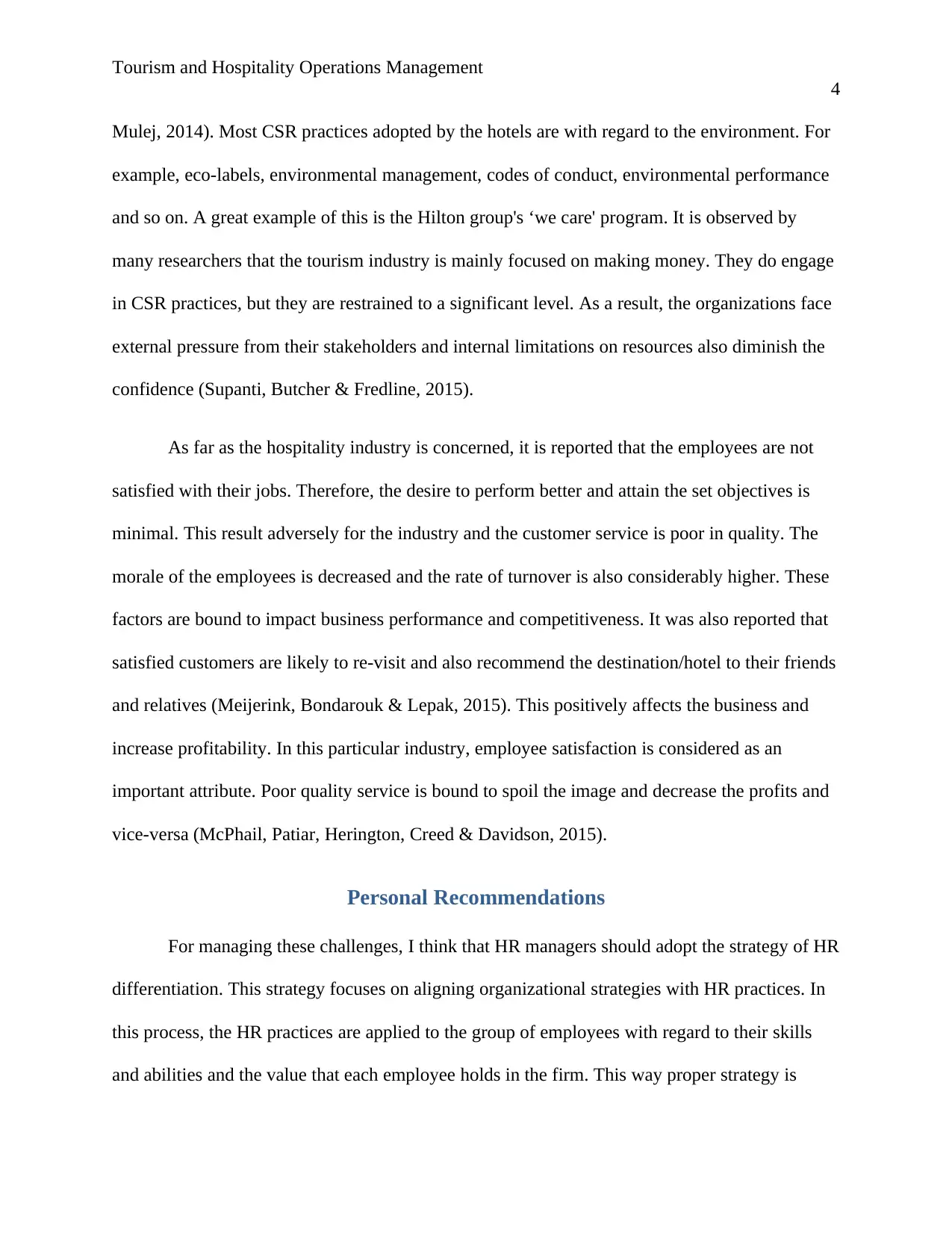
Tourism and Hospitality Operations Management
4
Mulej, 2014). Most CSR practices adopted by the hotels are with regard to the environment. For
example, eco-labels, environmental management, codes of conduct, environmental performance
and so on. A great example of this is the Hilton group's ‘we care' program. It is observed by
many researchers that the tourism industry is mainly focused on making money. They do engage
in CSR practices, but they are restrained to a significant level. As a result, the organizations face
external pressure from their stakeholders and internal limitations on resources also diminish the
confidence (Supanti, Butcher & Fredline, 2015).
As far as the hospitality industry is concerned, it is reported that the employees are not
satisfied with their jobs. Therefore, the desire to perform better and attain the set objectives is
minimal. This result adversely for the industry and the customer service is poor in quality. The
morale of the employees is decreased and the rate of turnover is also considerably higher. These
factors are bound to impact business performance and competitiveness. It was also reported that
satisfied customers are likely to re-visit and also recommend the destination/hotel to their friends
and relatives (Meijerink, Bondarouk & Lepak, 2015). This positively affects the business and
increase profitability. In this particular industry, employee satisfaction is considered as an
important attribute. Poor quality service is bound to spoil the image and decrease the profits and
vice-versa (McPhail, Patiar, Herington, Creed & Davidson, 2015).
Personal Recommendations
For managing these challenges, I think that HR managers should adopt the strategy of HR
differentiation. This strategy focuses on aligning organizational strategies with HR practices. In
this process, the HR practices are applied to the group of employees with regard to their skills
and abilities and the value that each employee holds in the firm. This way proper strategy is
4
Mulej, 2014). Most CSR practices adopted by the hotels are with regard to the environment. For
example, eco-labels, environmental management, codes of conduct, environmental performance
and so on. A great example of this is the Hilton group's ‘we care' program. It is observed by
many researchers that the tourism industry is mainly focused on making money. They do engage
in CSR practices, but they are restrained to a significant level. As a result, the organizations face
external pressure from their stakeholders and internal limitations on resources also diminish the
confidence (Supanti, Butcher & Fredline, 2015).
As far as the hospitality industry is concerned, it is reported that the employees are not
satisfied with their jobs. Therefore, the desire to perform better and attain the set objectives is
minimal. This result adversely for the industry and the customer service is poor in quality. The
morale of the employees is decreased and the rate of turnover is also considerably higher. These
factors are bound to impact business performance and competitiveness. It was also reported that
satisfied customers are likely to re-visit and also recommend the destination/hotel to their friends
and relatives (Meijerink, Bondarouk & Lepak, 2015). This positively affects the business and
increase profitability. In this particular industry, employee satisfaction is considered as an
important attribute. Poor quality service is bound to spoil the image and decrease the profits and
vice-versa (McPhail, Patiar, Herington, Creed & Davidson, 2015).
Personal Recommendations
For managing these challenges, I think that HR managers should adopt the strategy of HR
differentiation. This strategy focuses on aligning organizational strategies with HR practices. In
this process, the HR practices are applied to the group of employees with regard to their skills
and abilities and the value that each employee holds in the firm. This way proper strategy is
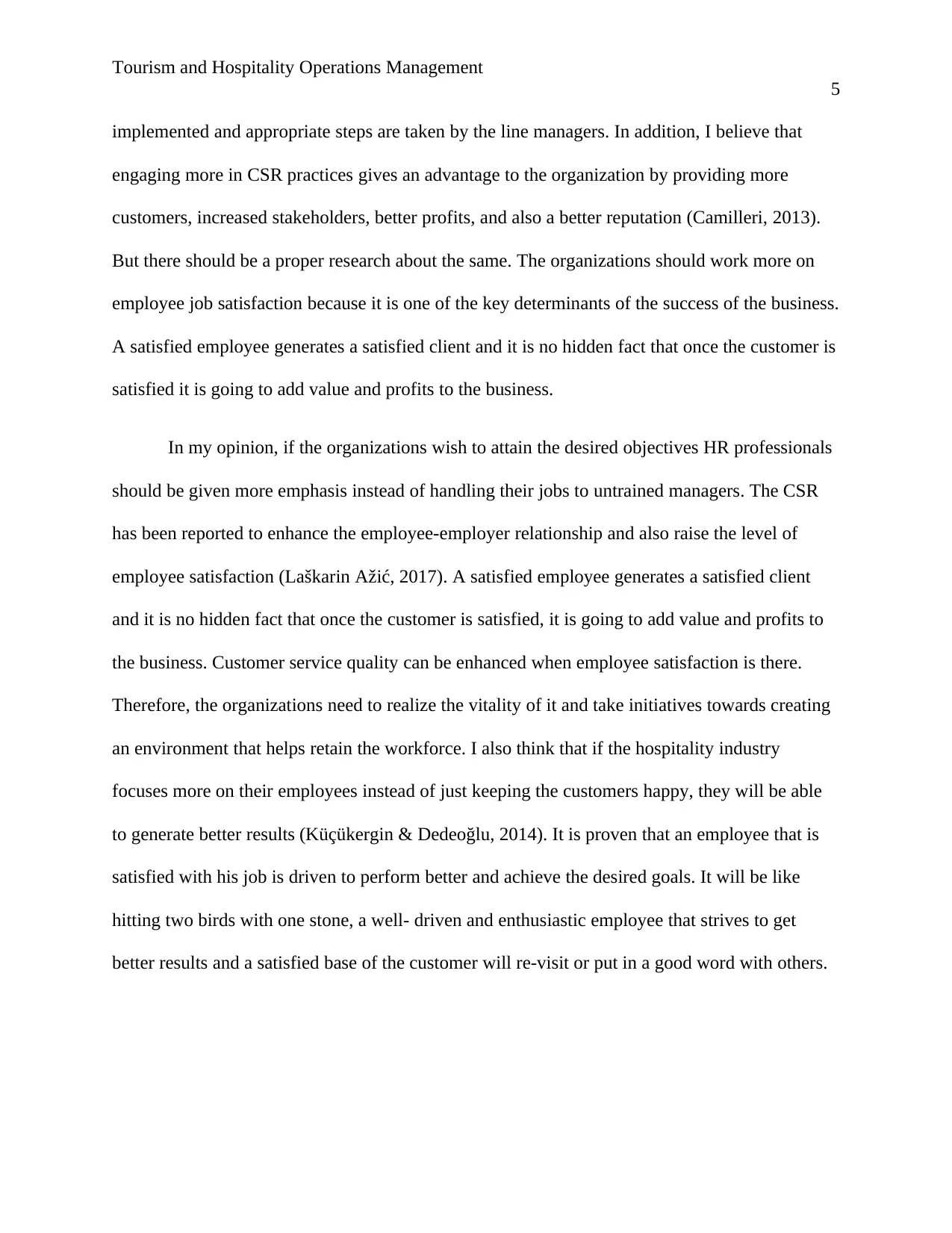
Tourism and Hospitality Operations Management
5
implemented and appropriate steps are taken by the line managers. In addition, I believe that
engaging more in CSR practices gives an advantage to the organization by providing more
customers, increased stakeholders, better profits, and also a better reputation (Camilleri, 2013).
But there should be a proper research about the same. The organizations should work more on
employee job satisfaction because it is one of the key determinants of the success of the business.
A satisfied employee generates a satisfied client and it is no hidden fact that once the customer is
satisfied it is going to add value and profits to the business.
In my opinion, if the organizations wish to attain the desired objectives HR professionals
should be given more emphasis instead of handling their jobs to untrained managers. The CSR
has been reported to enhance the employee-employer relationship and also raise the level of
employee satisfaction (Laškarin Ažić, 2017). A satisfied employee generates a satisfied client
and it is no hidden fact that once the customer is satisfied, it is going to add value and profits to
the business. Customer service quality can be enhanced when employee satisfaction is there.
Therefore, the organizations need to realize the vitality of it and take initiatives towards creating
an environment that helps retain the workforce. I also think that if the hospitality industry
focuses more on their employees instead of just keeping the customers happy, they will be able
to generate better results (Küçükergin & Dedeoğlu, 2014). It is proven that an employee that is
satisfied with his job is driven to perform better and achieve the desired goals. It will be like
hitting two birds with one stone, a well- driven and enthusiastic employee that strives to get
better results and a satisfied base of the customer will re-visit or put in a good word with others.
5
implemented and appropriate steps are taken by the line managers. In addition, I believe that
engaging more in CSR practices gives an advantage to the organization by providing more
customers, increased stakeholders, better profits, and also a better reputation (Camilleri, 2013).
But there should be a proper research about the same. The organizations should work more on
employee job satisfaction because it is one of the key determinants of the success of the business.
A satisfied employee generates a satisfied client and it is no hidden fact that once the customer is
satisfied it is going to add value and profits to the business.
In my opinion, if the organizations wish to attain the desired objectives HR professionals
should be given more emphasis instead of handling their jobs to untrained managers. The CSR
has been reported to enhance the employee-employer relationship and also raise the level of
employee satisfaction (Laškarin Ažić, 2017). A satisfied employee generates a satisfied client
and it is no hidden fact that once the customer is satisfied, it is going to add value and profits to
the business. Customer service quality can be enhanced when employee satisfaction is there.
Therefore, the organizations need to realize the vitality of it and take initiatives towards creating
an environment that helps retain the workforce. I also think that if the hospitality industry
focuses more on their employees instead of just keeping the customers happy, they will be able
to generate better results (Küçükergin & Dedeoğlu, 2014). It is proven that an employee that is
satisfied with his job is driven to perform better and achieve the desired goals. It will be like
hitting two birds with one stone, a well- driven and enthusiastic employee that strives to get
better results and a satisfied base of the customer will re-visit or put in a good word with others.
⊘ This is a preview!⊘
Do you want full access?
Subscribe today to unlock all pages.

Trusted by 1+ million students worldwide
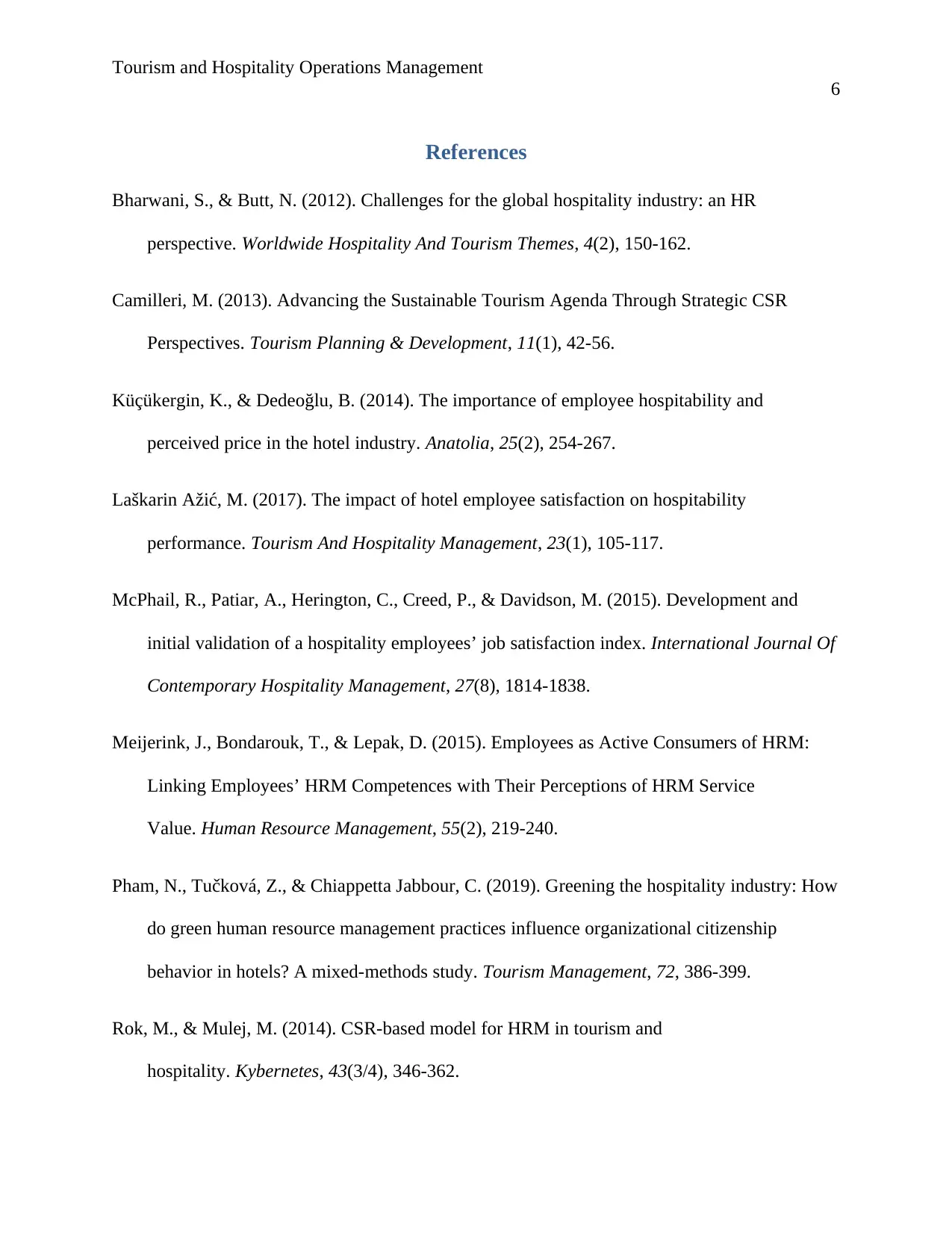
Tourism and Hospitality Operations Management
6
References
Bharwani, S., & Butt, N. (2012). Challenges for the global hospitality industry: an HR
perspective. Worldwide Hospitality And Tourism Themes, 4(2), 150-162.
Camilleri, M. (2013). Advancing the Sustainable Tourism Agenda Through Strategic CSR
Perspectives. Tourism Planning & Development, 11(1), 42-56.
Küçükergin, K., & Dedeoğlu, B. (2014). The importance of employee hospitability and
perceived price in the hotel industry. Anatolia, 25(2), 254-267.
Laškarin Ažić, M. (2017). The impact of hotel employee satisfaction on hospitability
performance. Tourism And Hospitality Management, 23(1), 105-117.
McPhail, R., Patiar, A., Herington, C., Creed, P., & Davidson, M. (2015). Development and
initial validation of a hospitality employees’ job satisfaction index. International Journal Of
Contemporary Hospitality Management, 27(8), 1814-1838.
Meijerink, J., Bondarouk, T., & Lepak, D. (2015). Employees as Active Consumers of HRM:
Linking Employees’ HRM Competences with Their Perceptions of HRM Service
Value. Human Resource Management, 55(2), 219-240.
Pham, N., Tučková, Z., & Chiappetta Jabbour, C. (2019). Greening the hospitality industry: How
do green human resource management practices influence organizational citizenship
behavior in hotels? A mixed-methods study. Tourism Management, 72, 386-399.
Rok, M., & Mulej, M. (2014). CSR-based model for HRM in tourism and
hospitality. Kybernetes, 43(3/4), 346-362.
6
References
Bharwani, S., & Butt, N. (2012). Challenges for the global hospitality industry: an HR
perspective. Worldwide Hospitality And Tourism Themes, 4(2), 150-162.
Camilleri, M. (2013). Advancing the Sustainable Tourism Agenda Through Strategic CSR
Perspectives. Tourism Planning & Development, 11(1), 42-56.
Küçükergin, K., & Dedeoğlu, B. (2014). The importance of employee hospitability and
perceived price in the hotel industry. Anatolia, 25(2), 254-267.
Laškarin Ažić, M. (2017). The impact of hotel employee satisfaction on hospitability
performance. Tourism And Hospitality Management, 23(1), 105-117.
McPhail, R., Patiar, A., Herington, C., Creed, P., & Davidson, M. (2015). Development and
initial validation of a hospitality employees’ job satisfaction index. International Journal Of
Contemporary Hospitality Management, 27(8), 1814-1838.
Meijerink, J., Bondarouk, T., & Lepak, D. (2015). Employees as Active Consumers of HRM:
Linking Employees’ HRM Competences with Their Perceptions of HRM Service
Value. Human Resource Management, 55(2), 219-240.
Pham, N., Tučková, Z., & Chiappetta Jabbour, C. (2019). Greening the hospitality industry: How
do green human resource management practices influence organizational citizenship
behavior in hotels? A mixed-methods study. Tourism Management, 72, 386-399.
Rok, M., & Mulej, M. (2014). CSR-based model for HRM in tourism and
hospitality. Kybernetes, 43(3/4), 346-362.
Paraphrase This Document
Need a fresh take? Get an instant paraphrase of this document with our AI Paraphraser
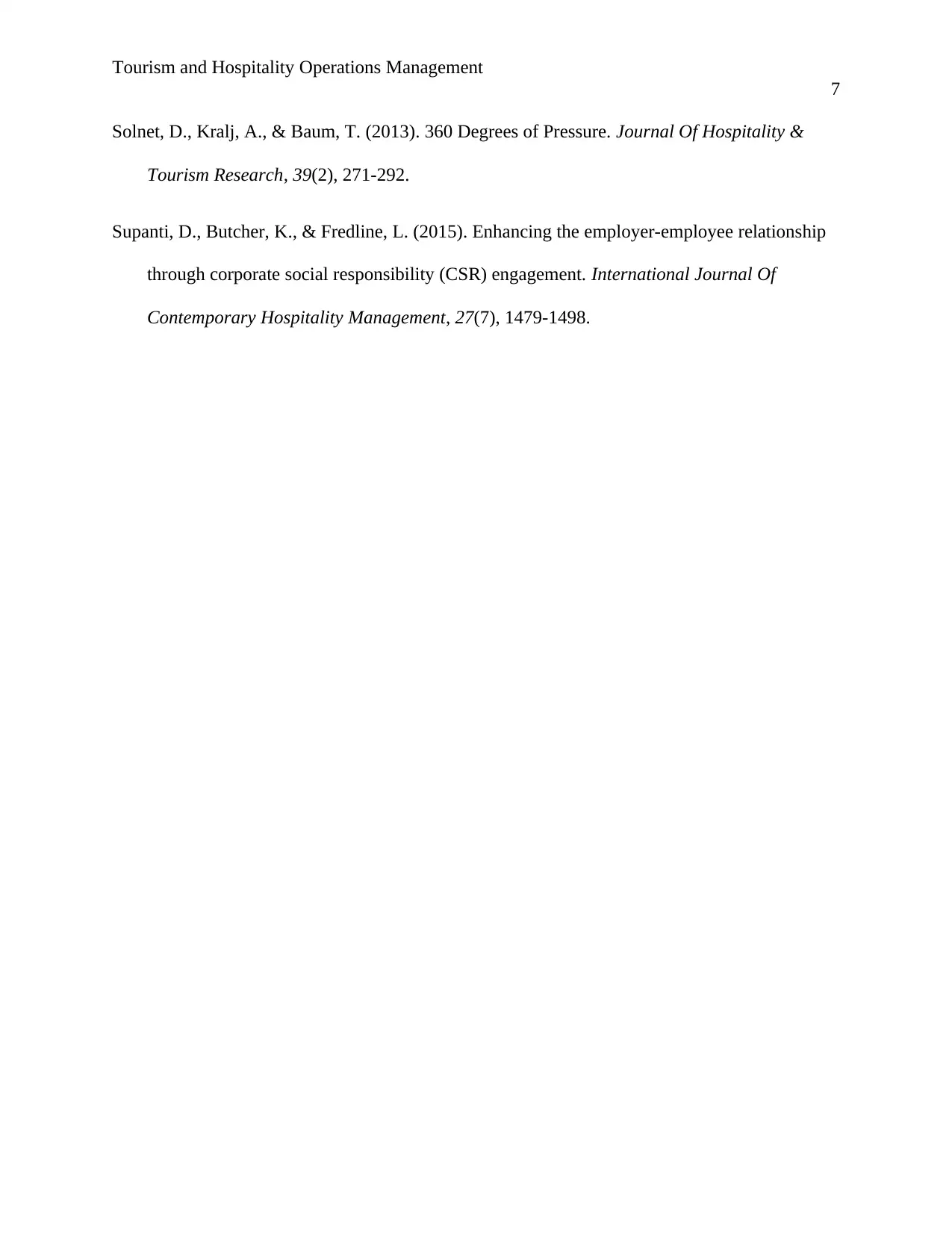
Tourism and Hospitality Operations Management
7
Solnet, D., Kralj, A., & Baum, T. (2013). 360 Degrees of Pressure. Journal Of Hospitality &
Tourism Research, 39(2), 271-292.
Supanti, D., Butcher, K., & Fredline, L. (2015). Enhancing the employer-employee relationship
through corporate social responsibility (CSR) engagement. International Journal Of
Contemporary Hospitality Management, 27(7), 1479-1498.
7
Solnet, D., Kralj, A., & Baum, T. (2013). 360 Degrees of Pressure. Journal Of Hospitality &
Tourism Research, 39(2), 271-292.
Supanti, D., Butcher, K., & Fredline, L. (2015). Enhancing the employer-employee relationship
through corporate social responsibility (CSR) engagement. International Journal Of
Contemporary Hospitality Management, 27(7), 1479-1498.
1 out of 8
Related Documents
Your All-in-One AI-Powered Toolkit for Academic Success.
+13062052269
info@desklib.com
Available 24*7 on WhatsApp / Email
![[object Object]](/_next/static/media/star-bottom.7253800d.svg)
Unlock your academic potential
Copyright © 2020–2026 A2Z Services. All Rights Reserved. Developed and managed by ZUCOL.





